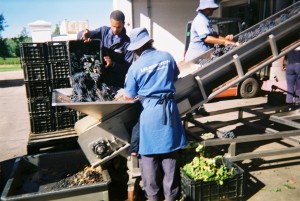Dr Agatha Herman is Lecturer in Human Geography with interests in ethics, geographies of justice and international development. In September 2014 Agatha began her Leverhulme Trust Early Career Fellowship in which she is exploring ‘the power of Fairtrade’ to bring about sustainable and empowering development both to and beyond its producer communities.
In recent years there have been growing criticisms of the certified Fairtrade movement both in academia and the media. However there has been a significant lack of research actually exploring the impact which Fairtrade has on the producer communities. Thanks to a British Council Researcher Links Travel Grant, since January Agatha has been in South Africa working with the Fairhills Association at Du Toitskloof Cooperative Cellar and Bosman-Adama (both Fairtrade wine producers) to really understand their experiences; focus groups and photo elicitation exercises with the farmworkers have illuminated the progress which has been made but also the continuing challenges they face.
She says, ‘I think that what makes my research so useful is that it helps producers identify their strengths and areas for improvement, and will give consumers a clearer idea of what their Fairtrade purchases are actually supporting. The need for Fairtrade and the context in which it finds itself varies from country to country so my research will take me to all of the current Fairtrade wine producing countries – South Africa, Chile, Argentina, Lebanon and Tunisia – in order to fully understand the system and its developmental impacts. In turn, this will help to strengthen the Fairtrade system itself by making it more effective, transparent and responsive.’
Agatha’s research interests in resilience and development in production systems as exemplified here connect into broader interests in food politics, ethics and power relations.
In recognition of her dedication Agatha has been invited to return as a visiting scholar to the Ruralia Institute at the University of Helsinki (Finland), where she will further her research on social resilience and cultural connections within agriculture through new writing collaborations as well as speaking about her findings so far in both the Mikkeli and Seinäjoki units. On route she will be stopping off in Bonn (Germany) to develop new connections with Fairtrade International in order to better understand the global systems and relations of Fairtrade in terms of its standards, how they are put into practise and how they connect into the international development aims of the organisation. To learn more about the contemporary fair trade movement, take a look at her forthcoming co-authored chapter with Mike Goodman in The Handbook of Research on Fair Trade, which will be published in June 2015.





